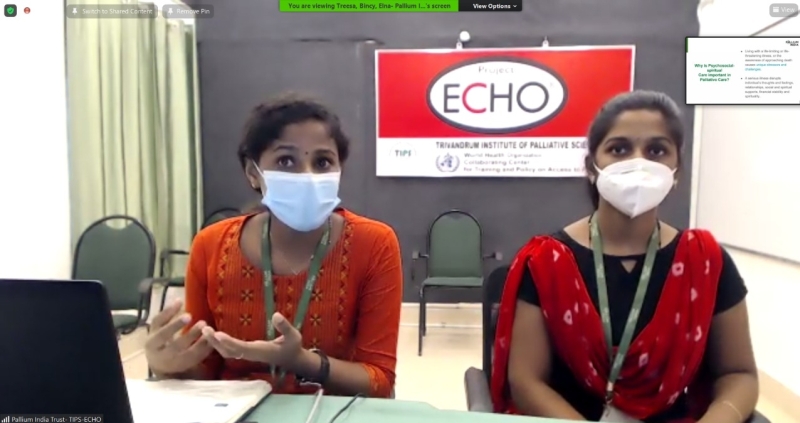The Role of Social Workers in Palliative Care
Krishnaraj Nambiar, Pallium India’s volunteer, writes:
A professional social worker plays an important role in palliative care as they provide the vital link between the clinical team, the society, the patient and his family.

On Oct 6, 2020, a webinar, the first of its kind, on the theme “The Role of Social Workers in Palliative Care” was held as part of this year’s World Hospice and Palliative Care Day celebrations, under the auspices of Pallium India, in collaboration with ECHO India, Kerala Association of Professional Social Workers (KAPS*) Trivandrum chapter and Social Work Students Association of Loyola college of Social Sciences, Trivandrum (SALT).
The session was presented by the team of Professional Social workers of Pallium India with Elna, Treesa and Bincy on stage with their excellent presentation, ably supported by the rest of the team and the credit for the successful conduct of the webinar goes to the entire team as can be judged by the attendance of a whopping 224 participants on Zoom (and many more watching Live on Facebook) and their encouraging comments. At the end of the session, questions raised from the audience were convincingly answered by the trio.

Here’s what they had to say regarding their role as Professional Social Workers.
So, what is Palliative Care? WHO defined Palliative care “as an approach that improves the quality of life of patients and their families facing the problems associated with life-threatening / limiting illness, through the prevention and relief of suffering by means of early identification and impeccable assessment and treatment of pain and other problems, Physical, Psychosocial and Spiritual. These problems are addressed by health professionals from different disciplines with the patient’s interest (and that of his family) being the first priority. Living with a life limiting/threatening illness or the awareness of approaching death disrupts an individual’s thoughts and feelings, relationships, social and spiritual support and financial stability.
This is where the role of a professional social worker gains importance in palliative care as they provide the vital link between the clinical team, the society, the patient and his family. Assessment of the patient’s / caregiver’s concerns and addressing them is an ongoing process as they often change over the course of the illness. Assessment covers an overview of the patient, his family, socio economic, psychological, psycho social, spiritual, psycho sexual before deciding on the interventions required and planning for the same. These factors demand a high degree of sensitivity, compassion, empathy from the social worker towards the patient and his family and their message “We care for you” works wonders.
Liaising with Government and Non-Government agencies, making available their financial schemes and health care facilities, rehabilitation of patients and their families including providing them vocational rehabilitation, social integration and bereavement support are other areas where a Social Worker in Palliative Care is involved in. It is only when all the above concerns of the patient and his family are addressed is Palliative Care truly complete.
Their presentation ended with a quote by Mahatma Gandhi, “The difference between what you can do and what you are capable of doing, will solve most of the world’s problems.”
*KAPS: (Kerala Association of professional social workers) was registered in 2012 to deal with issues related to their professional interests and promoting the quality and effectiveness of social work practices in Kerala, conduct appropriate research to contribute to the enhancement of knowledge that is beneficial to social workers, promote and facilitate member’s professional development throughout their career etc.







A comprehensive presentation by the team of prof. SW of Pallium India. A well organised and a systematic overview of the role and contributions of the SW to Palliative care.